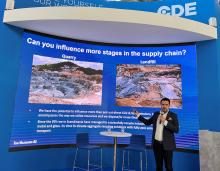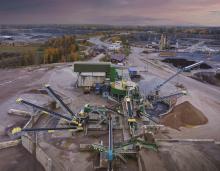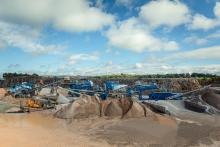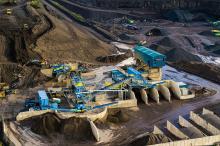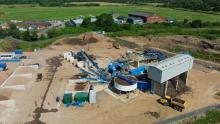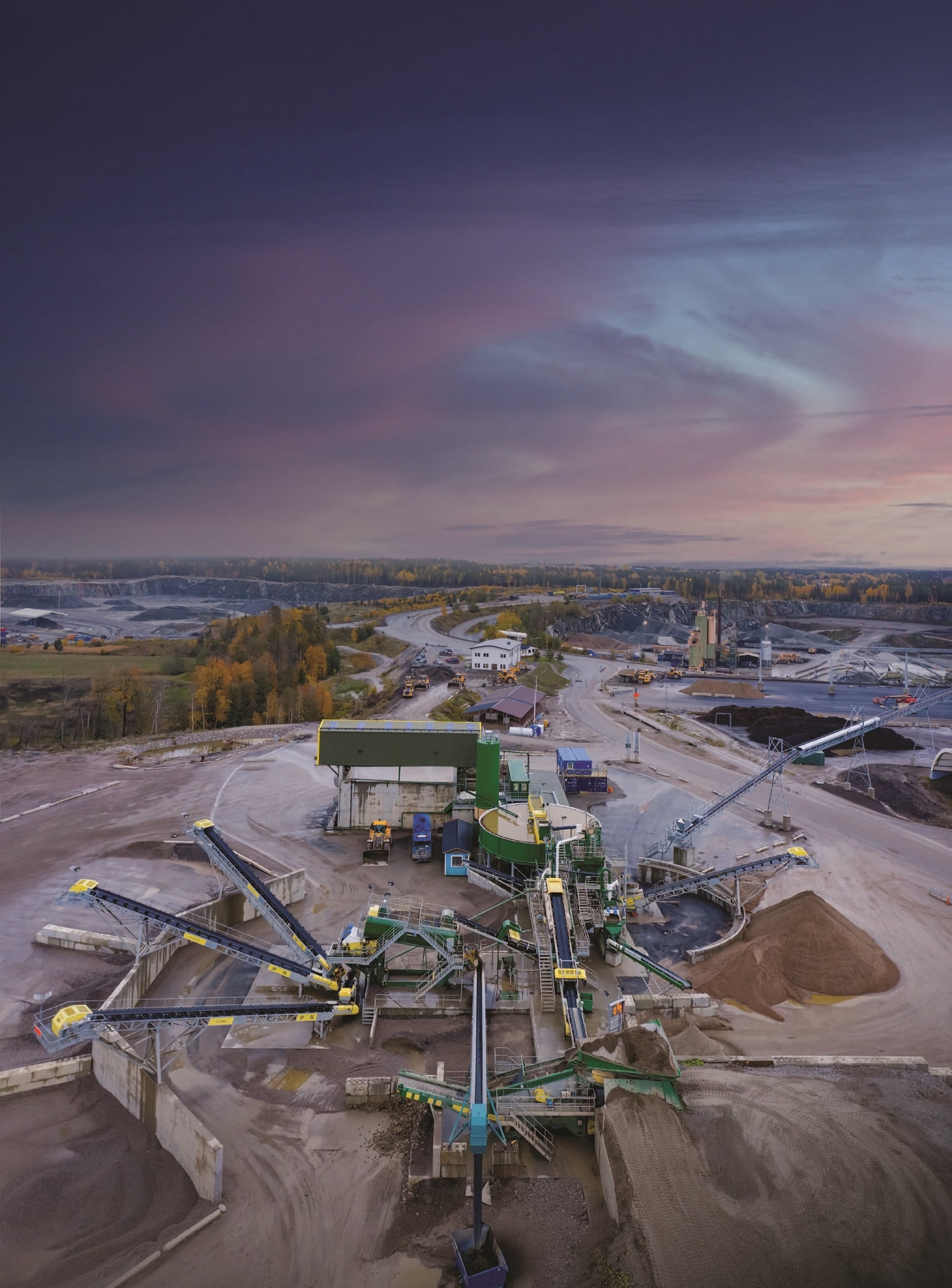
As the construction sector continues to cope with the availability and cost of raw materials, CDE will demonstrate the potential of construction, demolition and excavation (CD&E) waste to address the challenges facing the sector.
On October 26 and 27, it will be joined on stand by a number of its European customers for a series of round table discussions on the future of recycling, and, as part of the bauma exhibitor forum on 24 October, will deliver a lecture on the topic of Creating valuable in-spec products from CD&E waste.
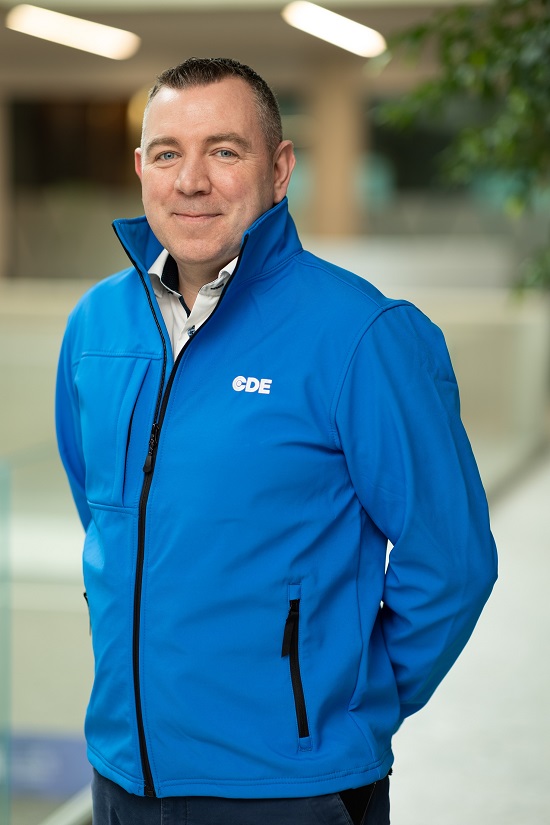
CDE's Head of Business Development for North West Europe, Eunan Kelly, observes: "In the current economic and social climate, with materials costs rising, resources depleting, and regulations calling for the adoption of sustainable solutions, we should look to the technology of today to produce the sustainable construction materials of tomorrow; how CDE's waste recycling solutions in their trademark blue can support the industry to transform CD&E waste into certified, in-spec sand and aggregates."
Earlier this year, a package of European Green Deal proposals were presented with a view to make sustainable products the norm within the EU internal market. The revised Construction Products Regulation (CPR) emphasises the value of construction to the EU as a key employer and economic contributor. However, it also highlights the adverse impacts the sector has on the environment, as one generating some 30% of the EU's annual waste and contributing significantly to its domestic carbon footprint and emissions.
The construction industry is a major economic driver; in the EU alone, 25 million people are employed across 5 million companies, according to data from the revised CPR. So, when the Covid-19 crisis gripped economies and construction output fell to some of its lowest ever levels, it was no surprise that robust recovery plans with a clear focus on investments in infrastructure were announced by nations around the world to rebound and stimulate economic growth.
However, the cost of raw materials and their availability remained a deepening challenge for the sector.
Materials shortages and their rising costs are not entirely symptoms of the pandemic, but they have been exacerbated by it and have become more acute, CDE's Business Development Manager for the DACH region, Christoph Baier, explains.
"Every day we continue to extract our fast-depleting natural resources to support rapid urbanisation and our modern, technological lifestyles. Essential to this is sand, the second most consumed natural resource after water and the most consumed solid material on earth."
In April, the UN Environment Programme (UNEP) published 10 recommendations to avert the impending sand crisis. It referenced how the use of sand, gravel, crushed stone and aggregates has tripled in the last two decades, reaching an estimated 40-50 billion metric tons per year (UNEP 2019).
"This, in the context of projected increases in global populations and urban living," Christoph continues, "demonstrates how demand will only rise, while resources will only deplete, unless we adopt long-term attitudinal, regulatory and technological change to ensure not only the sustainability of companies within the construction sector – and with it the livelihoods of those employed within it – but also the sustainability of the very planet.
"It's clear the consequences of a linear take, make and waste economy are catching up to us."
While Covid-19 economic recovery packages may help to stimulate growth, they must be conditional on building back greener, more sustainably, Christoph adds.
"We can set out ambitious plans to build and grow, but we must ask ourselves how sustainable this is without a new approach to how we extract and manage the lifecycle of finite natural resources."
A circular approach is the only answer, Eunan corroborates.
"It can be the means to equip us with the resources needed to supply a sector charged with a key role in the economic recovery while addressing our collective environmental footprint by reducing waste-to-landfill volumes and extending the lifespan of precious natural materials. All the while continuing to supply a resource-intense sector with the materials it requires; materials often trucked out of our urban centres where they are needed most."
He says the technology needed to extract recycled sand and aggregate resources from CD&E waste that are equivalent to their virgin quarried counterparts is already in operation throughout Europe.
"Many businesses are already on this pathway," he says, "and we will welcome many of them to join our upcoming round table discussions at bauma to share insights with the industry as we work to demonstrate that we can pursue commercial opportunities in a sustainable way."
CDE supports materials processors to realise the value locked in CD&E waste. Using highly innovative wet processing technologies that scrub material, float off lightweights (demolition debris) and classify end products, this waste stream can be repurposed to produce washed materials free of contaminants and suitable for use in high value construction projects.
To date, CDE solutions have supported companies around the world to divert over 100 million tonnes from landfill.
"These are far from 'alternative' materials," Eunan explains. "Many material processors utilising CDE technology are successfully producing CE- and BSI-certified concrete products, including competitive concrete for non-structural – but still high value – construction projects, with some applications successfully achieving beyond C45 spec."
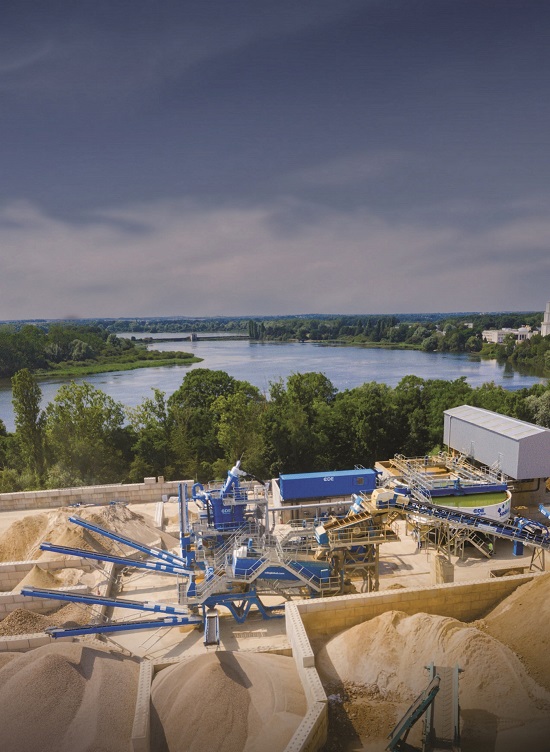
In Norway, Velde Pukk AS plays a significant role in meeting material demands in Stavanger. Utilising high-quality recycled aggregates and its on-site concrete batching plant, the firm supplies the construction industry with CE-certified concrete from 100% recycled aggregates.
DA Mattsson, based near Stockholm in Sweden, diverts almost 100% of its incoming CD&E waste from landfill through its CDE wet processing operation. The company produces high-quality sand and aggregates that meet EN 12620 specification, and it supplies these concrete materials to the Stockholm construction market.
They join some of the most advanced waste recycling plants designed and engineered by CDE in the DACH region, including the Switzerland-based WALO AG, whose 200tph CDE plant is processing a range of extremely variable feedstock, including excavation material and railway ballast. With sustainability as a focus, the plant features both closed-circuit water management and photovoltaic energy systems.
Similarly, in France, in the Greater Paris region, a 135tph wash plant enables Sodextra to produce a range of high quality and consistent in-spec concrete sand and aggregates called eco-sand and eco-gravel, thus ensuring Paris is now also building in a sustainable way.
"We are faced with a myriad of challenges, Eunan says. Set against the backdrop of the Covid-19 pandemic and continued rises in the cost of raw materials, these issues have been heightened and highlight the urgent need to radically adjust how we utilise the resources around us in a more circular fashion."
Christoph agrees: "We can build back greener using sustainably sourced and recycled construction materials. CDE technology is demonstrating the potential of CD&E waste streams and we look forward to welcoming some of our most pioneering customers from the French-speaking, DACH and Scandinavian regions to join us at bauma to talk about their vision, discuss best practice and share their experiences of collaborating with CDE."
CDE will attend bauma 2022 in Munich (October 24-30), stand 528 Hall B2. On the stand, using a combination of 3D animations, 360-degree virtual tours, 3D-printed models and augmented reality, the company will introduce a new way of immersing visitors in its process engineering expertise and some of its most innovative projects and products, including the leading AggMax and EvoWash technologies.
For more information about CDE and to register to meet the company at bauma, visit cdegroup.com/bauma

